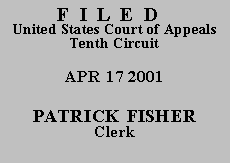

| UNITED STATES OF AMERICA, | No. 00-3298
(D.C. No. 00-CR-10019-01-WEB) (D. Kan.) |
The Presentence Investigation Report ("PSR") recommended applying the two-level enhancement of Sentencing Guidelines § 2D1.1(b)(1) because Hardesty possessed a dangerous weapon. (PSR, at 9.) With this enhancement, the guidelines range was exactly 60 months' imprisonment. (Id. at 16.) The PSR recited the following facts to support the enhancement:
On January 26, 2000, the police arrived at a house to respond to a call about a disturbance with a weapon, apparently involving a female. (PSR at 5.) They found Hardesty and another male and handcuffed both. (Id. at 6.) After searching the house twice, officers found the woman hiding in a clothes dryer. (Id.) She told the officers that Hardesty had forced his way into the house, conducted drug transactions, and fired his gun the night before. (Id.) The woman identified a knapsack in which the police found .357 ammunition as belonging to Hardesty. (Id.) She also directed them to a china cabinet because Hardesty "on other occasions kept the gun there." (Id.) The officers found a .357 handgun in plain view on the cabinet. (Id.) Another individual, who had run barefoot to a nearby liquor store in the snow to make the initial call to the police, stated that Hardesty had previously pulled a weapon and threatened to shoot him. (Id. at 6-7.) The officers found a second gun on the seat of a pickup truck of which Hardesty had care and custody earlier in the day. (Id.)
Hardesty objected to the enhancement for possessing a gun. (PSR at 19.) He asserted that the .357 handgun belonged to the woman found in the dryer, who owned the house. (Id.) He also disputed that the gun was in plain view, noting that the police had searched the house twice for the woman before finding it. (Id.) Without the enhancement, the guidelines range would be 57-60 months, although Hardesty acknowledged that the change "may be insignificant since the parties are not requesting a sentence above or below the 60 month maximum." (Id. at 20.)
At sentencing, neither party offered any evidence on the enhancement. (Doc. 46, at 3.) In response to Hardesty's objections, the district court stated, "It doesn't make any difference in the sentence I'm going to give. You've agreed on the sentence." (Id. at 5.) In its written order, the court stated,
The court finds that the two-level increase for possession of a gun is appropriate in this case. The statements from eyewitnesses indicating the defendant had been in possession of the gun, that he had been conducting drug transactions at the residence before he was arrested, and that the knapsack containing ammunition and drugs belonged to him all persuade the court by a preponderance of the evidence that the defendant was in possession of the gun and that it related to his drug trafficking.
The court notes that this objection would not affect the sentence in this case, because the court would impose the same sentence regardless of whether or not the two-point increase was applied.
(Doc. 34, at 1-2.)
On appeal, Hardesty continues to assert that the two-level enhancement was improper. The district court had jurisdiction under 18 U.S.C. § 3231. We have jurisdiction under 18 U.S.C. § 3742(a).
We need not reach the merits of this appeal because any error would be harmless. The district court unequivocally asserted that it would have imposed the same sentence regardless of the enhancement. Other courts of appeal have found that when a district court makes such a statement, it is not necessary to resolve which of two guidelines ranges applies if the sentence imposed falls within both. See United States v. Fairchild, 189 F.3d 769, 780 (8th Cir. 1999); United States v. Howard, 179 F.3d 539, 545 (7th Cir. 1999); United States v. Thompson, 994 F.2d 864, 868 (D.C. Cir. 1993); United States v. Garrett, 984 F.2d 1402, 1416 (5th Cir. 1993); cf. United States v. Urbanek, 930 F.2d 1512, 1516 (10th Cir. 1991) ("Unless the district court makes it clear during the sentencing proceeding that the sentence would be the same under either of the applicable Guideline ranges, we are compelled to remand for resentencing . . . ."). Similarly, we have held that when the record supports one basis for the district court's enhancement and we are convinced the court would have imposed the same sentence regardless of the status of the other bases, any error is harmless. See United States v. Anderson, 189 F.3d 1201, 1214 (10th Cir. 1999); cf. Williams v. United States, 503 U.S. 193, 203 (1992) ("[A] remand is appropriate unless the reviewing court concludes, on the record as a whole, that the error was harmless, i.e., that the error did not affect the district court's selection of the sentence imposed." (emphasis added)). We agree that in this case, a remand would not be warranted even if there was error, given the district court's statements and Hardesty's agreement not to seek a sentence of less than 60 months.
We therefore AFFIRM the district court's sentence.
ENTERED FOR THE COURT
David M. Ebel
Circuit Judge
*.After examining the briefs and appellate record, this panel has determined unanimously to grant the parties' request for a decision on the briefs without oral argument. See Fed. R. App. P. 34(f) and 10th Cir. R. 34.1(G). The case is therefore ordered submitted without oral argument. This Order and Judgment is not binding precedent, except under the doctrines of law of the case, res judicata, and collateral estoppel. The court generally disfavors the citation of orders and judgments; nevertheless, an order and judgment may be cited under the terms and conditions of 10th Cir. R. 36.3.